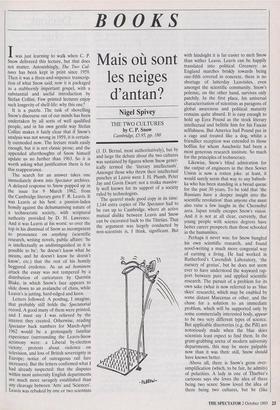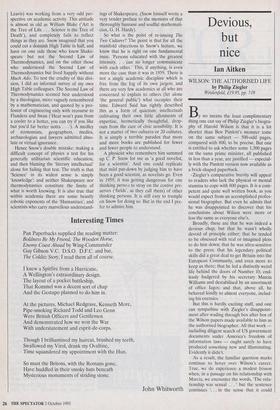BOOKS
Mais oü sont les neiges d'antan?
Nigel Spivey
THE TWO CULTURES by C. P. Snow Cambridge, £5.95, pp. 180 Iwas just learning to walk when C. P. Snow delivered this lecture, but that does not matter. Astonishingly, The Two Cul- tures has been kept in print since 1959. Then it was a three-and-sixpence transcrip- tion of what Snow said; now it is packaged as a stubbornly important gospel, with a substantial and useful introduction by Stefan Collini. Few printed lectures enjoy such longevity of shelf-life: why this one?
It is a puzzle. The task of shovelling Snow's discourse out of our minds has been undertaken by all sorts of well qualified people, and in his own gentle way Stefan CoRini makes it fairly clear that if Snow's analysis was not wrong in 1959, it is certain- ly outmoded now. The lecture reads easily enough, but it is not classic prose; and the appended afterthoughts of Snow himself update us no further than 1963. So it is worth asking what justification there is for this reappearance.
. The search for an answer takes one immediately down into Spectator archives. A delayed response to Snow popped up in the issue for 9 March 1962, from the Cambridge literary guru F. R. Leavis. It was Leavis at his best: a passion-laden homily against the dehumanising nature of a technocratic society, with scriptural authority provided by D. H. Lawrence. And it was Leavis at his worst: so over the top in his dismissal of Snow as incompetent to pronounce on anything (scientific research, writing novels, public affairs: 'he is intellectually as undistinguished as it is possible to be'; 'he doesn't know what he means, and he doesn't know he doesn't know', etc.) that the rest of his homily beggared credence. As an ad hominem attack the essay was not tempered by a distribution of caricatures by Quentin Blake, in which Snow's face appears to slide down to an avalanche of chins, while Leavis's is jutting, hard-edged and keen.
Letters followed. A postbag, I imagine, that probably still holds the Spectatotial record. A good many of them were printed, and I must say I was relieved by the interest they created. Otherwise, reading Spectator back numbers for March-April 1962 would be a grotesquely familiar experience (surrounding the Leavis-Snow acrimony were: a Liberal by-election victory; protests about violence on television, and loss of British sovereignty in Europe; notice of outrageous rail fare increases). But the letters confirmed what I had already suspected: that the disputes Within most university English departments are much more savagely established than any cleavage between 'Arts' and 'Sciences'. Leavis was rebuked by one or two scientists
(J. D. Bernal, most authoritatively), but by and large the debate about the two cultures was sustained by figures whom Snow gener- ically termed the 'literary intellectuals'. Amongst those who threw their intellectual punches at Leavis were J. H. Plumb, Peter Jay and Gavin Ewart: not a troika massive- ly well known for its support of a society ruled by technologists.
The quarrel made good copy in its time: 1,144 extra copies of The Spectator had to be run up to Cambridge, where an active mutual dislike between Leavis and Snow can be excavated back to the Thirties. That the argument was largely conducted by non-scientists is, I think, significant. But
with hindsight it is far easier to melt Snow than wither Leavis. Leavis can be happily translated into political Greenery: as England marches briskly towards being one-fifth covered in concrete, there is no shortage of latterday Leavisites, even amongst the scientific community. Snow's polemic, on the other hand, survives only patchily. In the first place, his universal characterisation of scientists as paragons of global awareness and political maturity remains quite absurd. It is easy enough to hold up Ezra Pound as the stock literary intellectual and belittle him for his Fascist selfishness. But America had Pound put in a cage and treated like a dog, whilst a friendlier reception was extended to those boffins for whom Auschwitz had been a most generous research institute. So much for the principles of technocracy.
Likewise, Snow's blind admiration for the output of engineers in the then Soviet Union is now a rotten joke: at least, it would surely seem that way to any babush- ka who has been standing in a bread queue for the past 30 years. To be told that 'the Russians have a deeper insight into the scientific revolution' than anyone else must also raise a few laughs in the Chernobyl area. Japan totally escapes Snow's vision. And it is not at all clear, currently, that young people with science degrees have better career prospects than those schooled in the humanities.
Perhaps it never was: for Snow bungled his own scientific research, and found novel-writing a much more congenial way of earning a living. He had worked in Rutherford's Cavendish Laboratory, 'the nursery of genius', but he does not seem ever to have understood the wayward rap- port between pure and applied scientific research. The pursuit of a problem for its own sake (what is now referred to as 'blue skies' research), which may be enabled by some distant Maecenas or other, and the chase for a solution to an immediate problem, which will be supported only by some commercially interested body, appear to be two very different types of science. But applicable discoveries (e.g. the Pill) are notoriously made when the blue skies scientists least expect to find them. In the grant-grubbing arena of modern university departments, this may be more palpable now than it was then: still, Snow should have known better.
Above all, there is Snow's gross Over- simplification (which, to be fair, he admits) of polarities. A lady in one of Thurber's cartoons says she loves the idea of there being two sexes: Snow loved the idea of there being two cultures, but he (like
Leavis) was working from a very odd per- spective on academic activity. This attitude is almost as old as William Blake ('Art is the Tree of Life . . Science is the Tree of Death'), and completely fails to reflect things as they are. Snow imagined that you could cut a donnish High Table in half, and have on one side those who knew Shake- speare but not the Second Law of Thermodynamics, and on the other those who understood the Second Law of Thermodynamics but lived happily without Much Ado. To test the crudity of this divi- sion, I did an informal survey of my own High Table colleagues. The Second Law of Thermodynamics seemed best understood by a theologian, more vaguely remembered by a mathematician, and quoted by a pro- fessor of engineering only with recourse to Flanders and Swan ('Heat won't pass from a cooler to a hotter, you can try if you like but you'd far better notta . . .'). A medley of economists, geographers, medics, archaeologists and lawyers admitted abso- lute or virtual ignorance.
Hence Snow's double mistake: making a difficult concept of physics a test for his generally utilitarian scientific education, and then blaming the 'literary intellectual' alone for failing that test. The truth is that 'Science' in its widest sense is simply 'knowledge': and neither Shakespeare nor thermodynamics constitute the limits of what is worth knowing. It is also true that within academia there are some beastly robotic exponents of the 'Humanities', and scientists who carry marvellous understand-
ings of Shakespeare. (Snow himself wrote a very tender preface to the memoirs of that thoroughly humane and soulful mathemati- cian, G. H. Hardy).
So what is the point of re-issuing The Two Cultures? The point is that for all the manifold objections to Snow's lecture, we know that he is right on one fundamental issue: 'Persons educated with the greatest intensity. . . can no longer communicate with each other.' This, if anything, is even more the case than it was in 1959. There is not a single academic discipline which is free from the fog of its own jargon; and there are very few academics at all who are concerned to explain to others (let alone 'the general public') what occupies their time. Edward Said has rightly described this as a form of quietism: intellectuals cultivating their own little allotments of expertise, hermetically thoughtful, drop- outs from the care of civic sensibility. It is not a matter of two cultures or 20 cultures. It is simply a terrible paradox that more and more books are published for fewer and fewer people to understand.
A physicist who remembers him summed up C. P. Snow for me as 'a good novelist, for a scientist'. And one could replicate that mild put-down by judging him to have been a good scientist, as novelists go. Even in 1959, it was getting dangerous for one thinking persod to stray on the costive pre- serves ('fields', as they call them) of other thinking persons. It is still easy to trample on Snow for doing so. But in the end I pre- fer to admire him.



















































 Previous page
Previous page